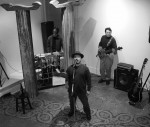In the late 1970s, Jesus Velo and Willie Herrón of punk rock band, Los Illegals, aimed to provide a space for Chicano culture in East L.A.
Under the name “Spine of Califas,” the musicians have partnered and toured with the writers of Taco Shop Poets, coalescing the voices of two Chicano generations through a meshing of music and poetry. Friday evening’s performance at the Powell Library rotunda will feature readings by the Taco Shop Poets and Los Angeles-based poets Jessica Ceballos and Paul Calderon in unison with music performed by Los Illegals.
The “Spine of Califas” tour merges musical expressions of ’70s punk rockers, Herrón and Velo, with a second wave of ’90s Chicano writers who gained traction performing at taco shops and unconventional public spaces around the community.
“For some reason, (the second wave) and our generation needed each other to do something to shake up the power structure of poetry because it was really basic and torpid,” said Velo.
Over the past decade, “Spine of Califas” has performed in locations such as San Francisco’s Mission District and L.A.’s Getty Museum.
“(Herrón and Velo) provide a tapestry to be able to fit in your ideas and to understand past experiences,” said Adrian Arancibia from Taco Shop Poets.
Arancibia said his readings will discuss his hometown of San Diego, aiming to give the audience an experience of what it’s like being an elderly or young person crossing the border or living alongside the border.
Herrón said he thinks the best part of the performance is the fact that it has to be spontaneous.
“We have no idea what we are going to do until the day before or who is going to show up until we get to the gig,” Herrón said.
Velo said he and Herrón struggled to find anything worthwhile to work with literature-wise until the Taco Shop Poets, who had a reputation as a radical poetry group, contacted them.
“I hear the poets doing their part, while the soundtrack is providing a nice carpet for them,” Herrón said. “The poet and the music just blend as though they get on the carpet and go on that ride.”
Arancibia said the members of the Taco Shop Poets come from various places like Chile and Mexico and embrace diversity as a theme of Chicano culture in their poetry.
“When you talk about the tapestry of what it is to be able to be in this group, it is a tapestry of different experiences that reveal much about the future of California as much as it is the present of California,” Arancibia said.
Similar to the Taco Shop Poets’ presence in Chicano communities, Adolfo Guzmán-López said Los Illegals established spaces in East L.A. for Chicano culture to thrive in the early ’80s.
“Los Illegals tried to go to the west side (of L.A.) to play in that very strong folk scene of the ’70s, early ’80s in L.A. and those spaces were closed,” Guzmán-López said. “Rather than sulk and just go home, they created the center of a cultural universe in East L.A. that people gravitated to.”
Arancibia said he thinks there are many first-generation immigrants at UCLA who may relate to the poetic readings.
“You talk to university students about your past experiences and how they reflect on it in terms of their own identity, their own culture and it’s really wonderful,” Arancibia said.
Velo said “Spine of Califas” aims to take poetry out of the coffee shops, removing the bongos and standup bass and bringing the real experience of the community into a direct public space.
“Always just tearing down whatever the power structure is, just challenging it, is so much fun to do,” Velo said. “It is like taking your cultural bully and just beating the crap out of them, and that is what we have been continually doing.”
